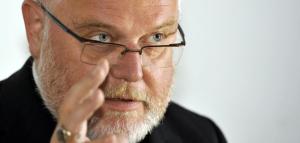“We must journey and continue: not with the enthusiasm of running ahead to reach coveted goals, but walking patiently together, under the gaze of God. Some themes – I think of the Church, the Eucharist and the ecclesial ministry – merit precise and well shared reflections.”
 Words from Pope Francis, in an audience with delegates from the German Lutheran Church yesterday. He was, not unexpectedly, speaking about ecumenism, urging continuing theological dialogue between various Christian churches and communities. The goals of ecumenism are often enticing, and this may cause some to get ahead of themselves. The themes Pope Francis mentioned – the Church, the Eucharist and the ecclesial ministry – reflect the goals of a shared understanding of what the Church is, a shared belief in the Eucharist and a shared understanding of the priesthood and other ministries in the Church, and which are often assumed to have been achieved already.
Words from Pope Francis, in an audience with delegates from the German Lutheran Church yesterday. He was, not unexpectedly, speaking about ecumenism, urging continuing theological dialogue between various Christian churches and communities. The goals of ecumenism are often enticing, and this may cause some to get ahead of themselves. The themes Pope Francis mentioned – the Church, the Eucharist and the ecclesial ministry – reflect the goals of a shared understanding of what the Church is, a shared belief in the Eucharist and a shared understanding of the priesthood and other ministries in the Church, and which are often assumed to have been achieved already.
 This quote is especially interesting as a document was leaked yesterday which stated that the German bishops’ proposed pastoral outreach to interdenominational couples – which included the proposal to allow non-Catholic spouses to receive Communion under certain circumstances – is not fit to be published. The document is dated on the 25th of May, and was sent by the prefect of the Congregation of the Doctrine of the Faith, Archbishop Luis Ladaria, to the German bishops who participated in the meeting with the CDF and other dicasteries on 3 May. The letter makes it clear that it was sent with the express agreement of the Pope, who discussed the matter with Archbishop Ladaria in two separate audiences.
This quote is especially interesting as a document was leaked yesterday which stated that the German bishops’ proposed pastoral outreach to interdenominational couples – which included the proposal to allow non-Catholic spouses to receive Communion under certain circumstances – is not fit to be published. The document is dated on the 25th of May, and was sent by the prefect of the Congregation of the Doctrine of the Faith, Archbishop Luis Ladaria, to the German bishops who participated in the meeting with the CDF and other dicasteries on 3 May. The letter makes it clear that it was sent with the express agreement of the Pope, who discussed the matter with Archbishop Ladaria in two separate audiences.
The prefect identifies three reasons why the proposal is problematic:
- “The question of allowing Evangelical Christians in interdenominational marriages [to receive Communion] is a topic that affects the faith of the Church and is significant for the universal Church.”
- “This question also affects the ecumenical relationships with other churches and church communities, which cannot be underestimated.”
- “The topic concerns the law of the Church, above all the interpretation of canon 844. Because there are unanswered questions about this point in some parts of the Church, the competent dicasteries of the Holy See have already been tasked with bringing about a speedy clarification of these issues at the level of the unversal Church. It seems particularly appropriate to leave the judgement of the existence of an “urgent grace necessity” to the diocesan bishop.”
In short, the judgement of the Congregation for the Doctrine of the Faith is much like what Cardinal Rainer Woelki said several days ago: “We in Germany do not live on an island of Blesseds. We are not a national church. We are a part of the great universal Church.”
Recently, Cardinal Woelki again explained his reasons for opposing to proposed outreach. He indicated the unwritten rule that a non-Catholic spouse presenting him- or herself for Communion is never sent away, but, the Cardinal said, these “pastorally motivated exceptions” can’t be “codified onto a new norm.” They belong in the “area of personal pastoral care, of spiritual guidance, of confession and the individual conscientious decision of the faithful” and can’t be formally tied into the status of interdenominational spouses.
 Cardinal Reinhard Marx, president of the German Bishops’ Conference and one of the supporters of the pastoral outreach, has admitted his surprise as the CDF letter. Perhaps rightly, he contrasts it with the initial request from the pope, that the bishops try and find a solution that is as unanimous as possible. Cardinal Marx said that that hasn’t been tried, let alone achieved, yet. He sees the need to discuss the topic in the meetings of the standing council of the conference and the autumn plenary meeting, but also with the dicasteries in Rome and with the Holy Father himself.
Cardinal Reinhard Marx, president of the German Bishops’ Conference and one of the supporters of the pastoral outreach, has admitted his surprise as the CDF letter. Perhaps rightly, he contrasts it with the initial request from the pope, that the bishops try and find a solution that is as unanimous as possible. Cardinal Marx said that that hasn’t been tried, let alone achieved, yet. He sees the need to discuss the topic in the meetings of the standing council of the conference and the autumn plenary meeting, but also with the dicasteries in Rome and with the Holy Father himself.